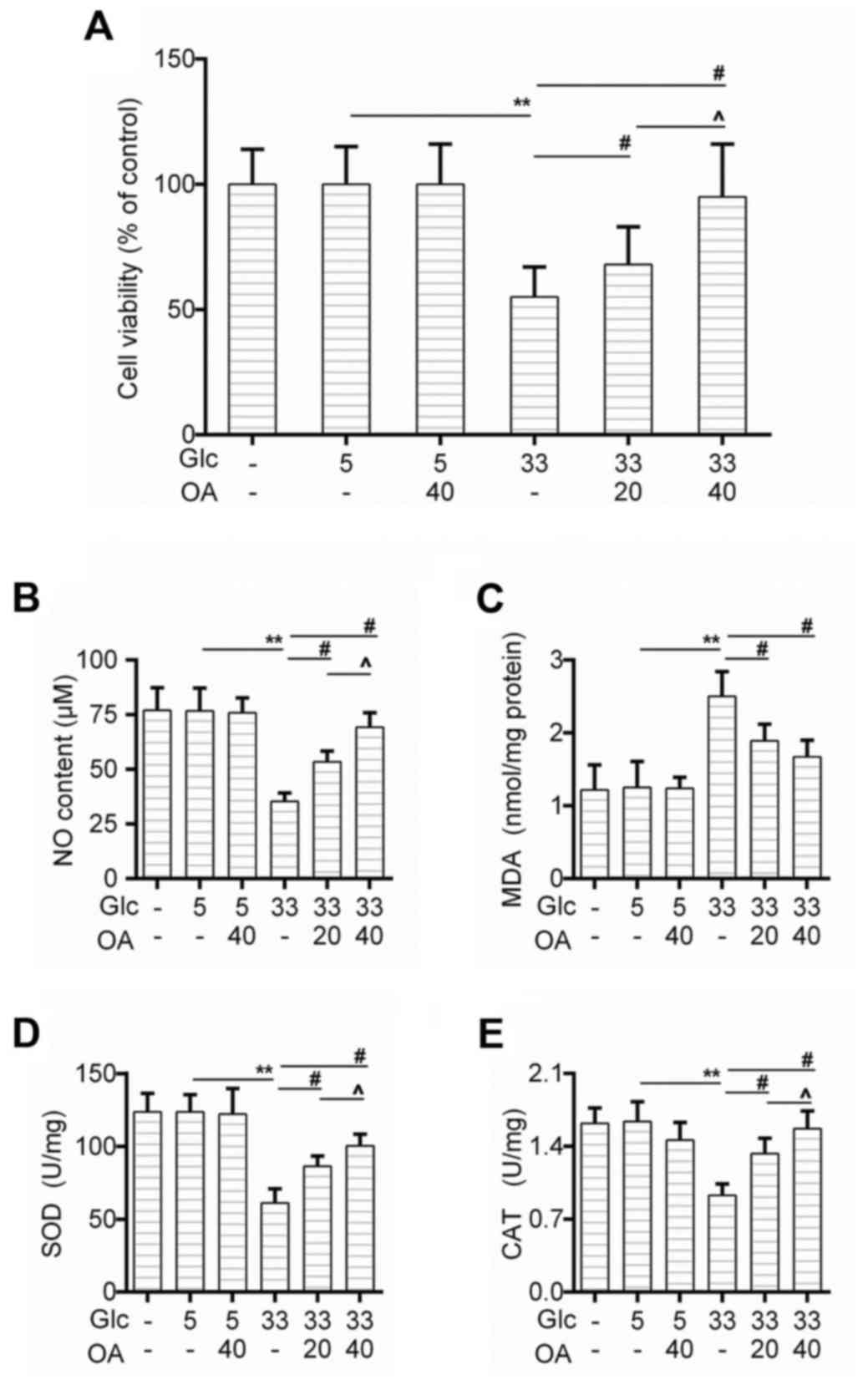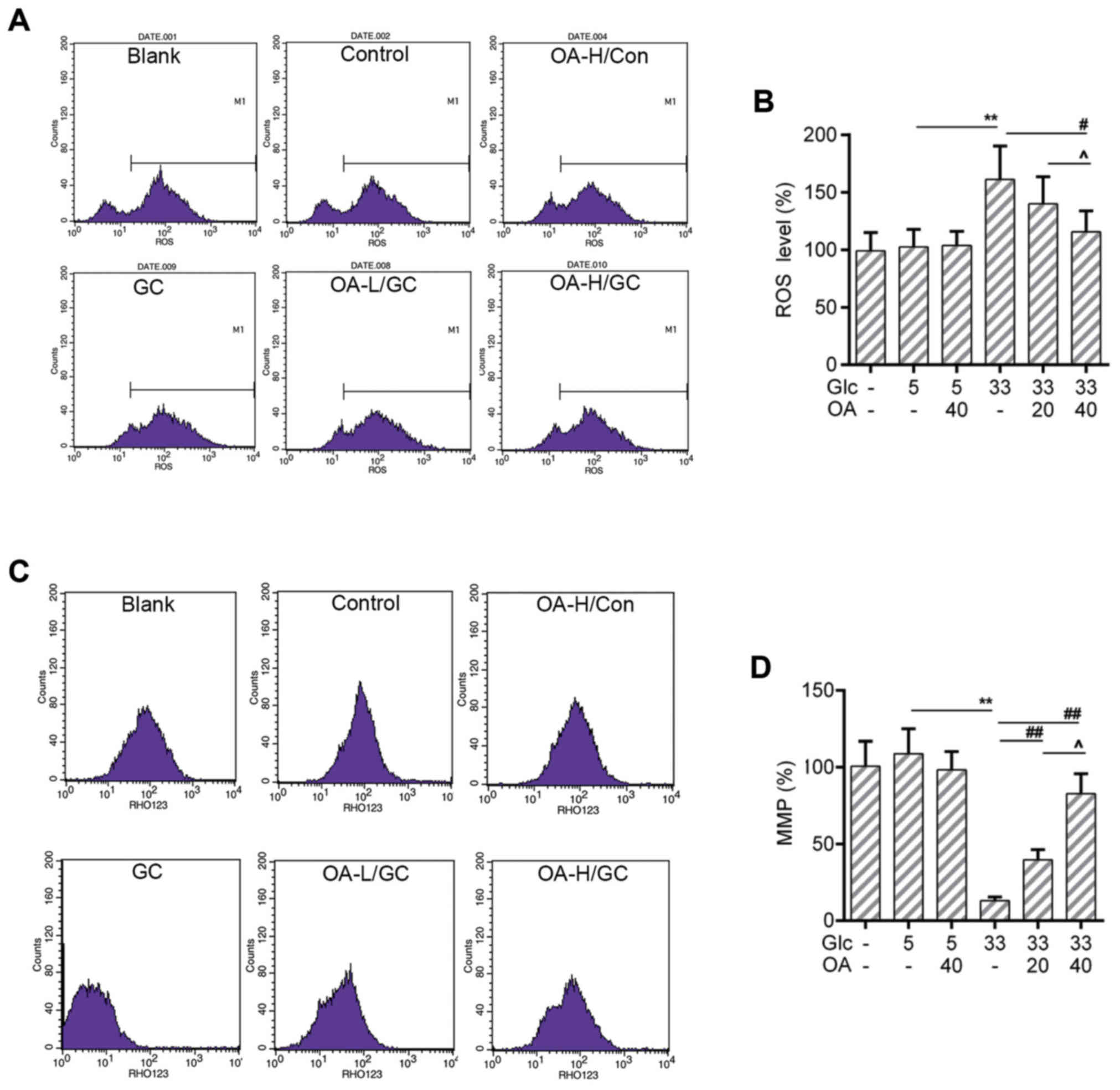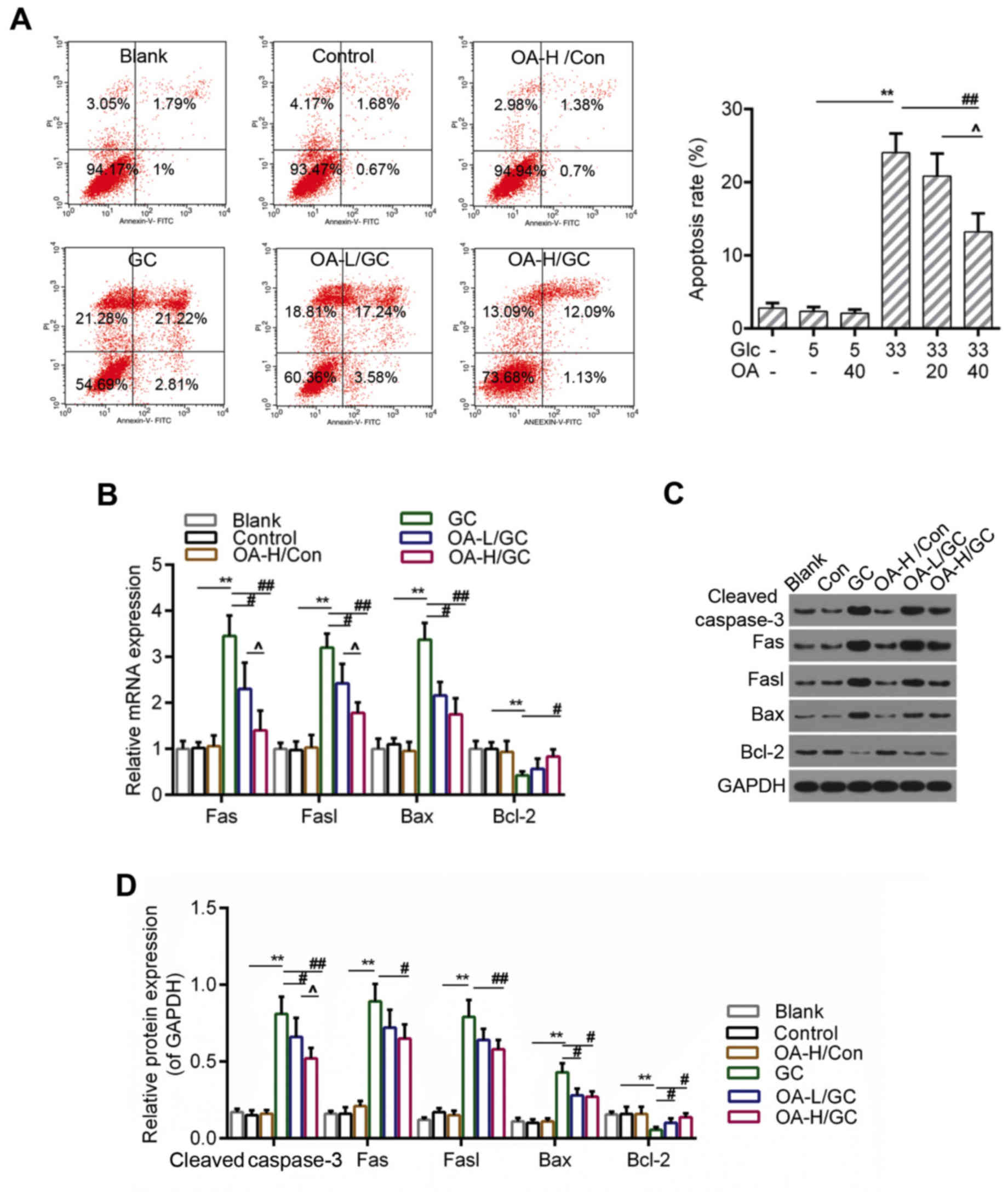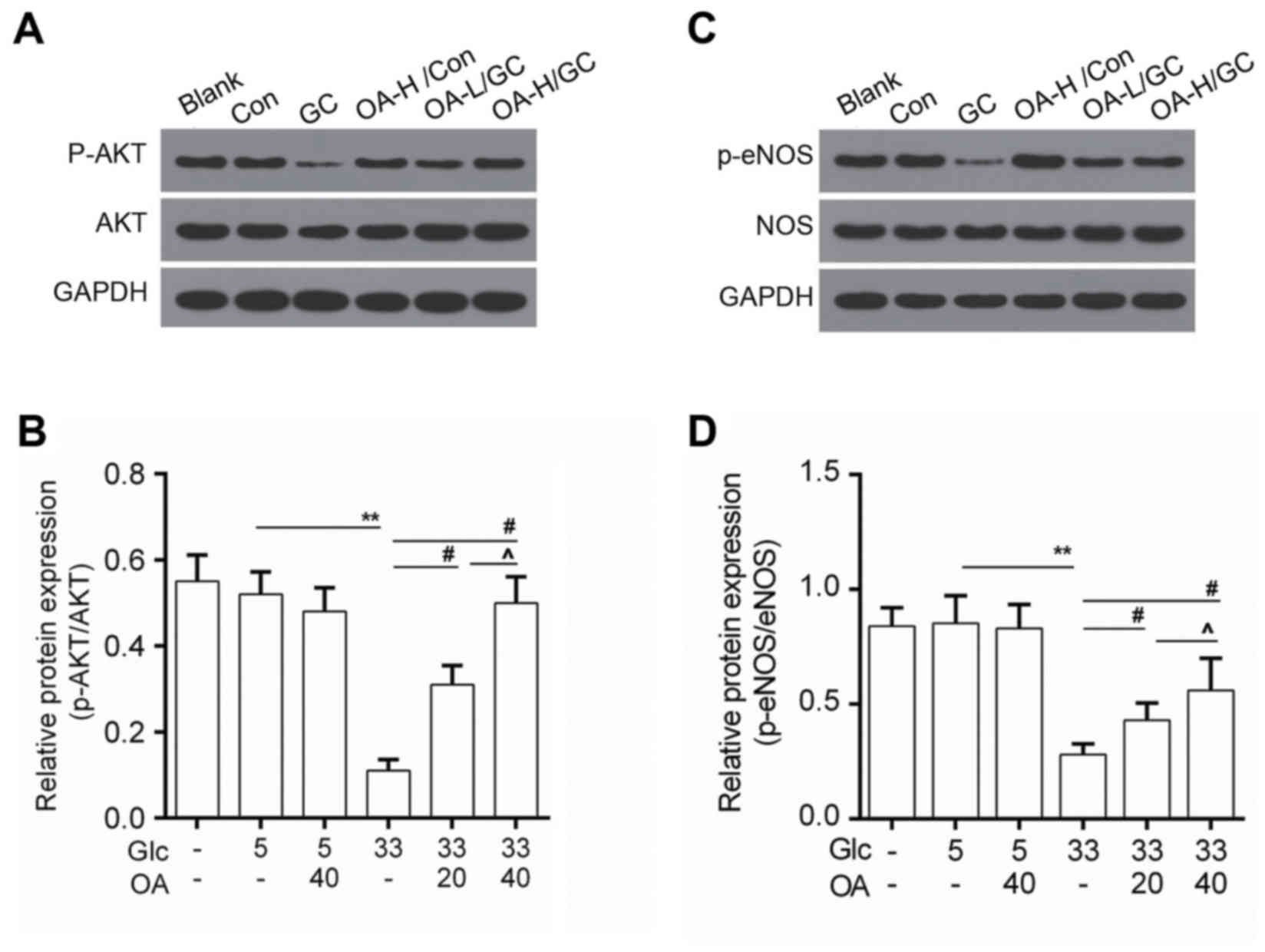|
1
|
Resnick HE and Howard BV: Diabetes and
cardiovascular disease. Annu Rev Med. 53:245–267. 2002. View Article : Google Scholar : PubMed/NCBI
|
|
2
|
Lee RT, Schoen FJ, Loree HM, Lark MW and
Libby P: Circumferential stress and matrix metalloproteinase 1 in
human coronary atherosclerosis. Implications for plaque rupture.
Arterioscler Thromb Vasc Biol. 16:1070–1073. 1996. View Article : Google Scholar : PubMed/NCBI
|
|
3
|
Salmi M, Stolen C, Jousilahti P, Yegutkin
GG, Tapanainen P, Janatuinen T, Knip M, Jalkanen S and Salomaa V:
Insulin-regulated increase of soluble vascular adhesion protein-1
in diabetes. Am J Pathol. 161:2255–2262. 2002. View Article : Google Scholar : PubMed/NCBI
|
|
4
|
Nishikawa T, Edelstein D, Du XL, Yamagishi
S, Matsumura T, Kaneda Y, Yorek MA, Beebe D, Oates PJ, Hammes HP,
et al: Normalizing mitochondrial superoxide production blocks three
pathways of hyperglycaemic damage. Nature. 404:787–790. 2000.
View Article : Google Scholar : PubMed/NCBI
|
|
5
|
Onat D, Brillon D, Colombo PC and Schmidt
AM: Human vascular endothelial cells: A model system for studying
vascular inflammation in diabetes and atherosclerosis. Curr Diab
Rep. 11:193–202. 2011. View Article : Google Scholar : PubMed/NCBI
|
|
6
|
Echtay KS, Murphy MP, Smith RA, Talbot DA
and Brand MD: Superoxide activates mitochondrial uncoupling protein
2 from the matrix side. Studies using targeted antioxidants. J Biol
Chem. 277:47129–47135. 2002. View Article : Google Scholar : PubMed/NCBI
|
|
7
|
Storz G and Imlay JA: Oxidative stress.
Curr Opin Microbiol. 2:188–194. 1999. View Article : Google Scholar : PubMed/NCBI
|
|
8
|
Bullon P, Newman HN and Battino M:
Obesity, diabetes mellitus, atherosclerosis and chronic
periodontitis: A shared pathology via oxidative stress and
mitochondrial dysfunction? Periodontol. 64:139–153. 2014.
View Article : Google Scholar
|
|
9
|
Vornoli A, Pozzo L, Della Croce CM,
Gervasi PG and Longo V: Drug metabolism enzymes in a steatotic
model of rat treated with a high fat diet and a low dose of
streptozotocin. Food Chem Toxicol. 70:54–60. 2014. View Article : Google Scholar : PubMed/NCBI
|
|
10
|
Yang SJ, Je Lee W, Kim EA, Dal Nam K, Hahn
HG, Young Choi S and Cho SW: Effects of
N-adamantyl-4-methylthiazol-2-amine on hyperglycemia,
hyperlipidemia and oxidative stress in streptozotocin-induced
diabetic rats. Eur J Pharmacol. 736:26–34. 2014. View Article : Google Scholar : PubMed/NCBI
|
|
11
|
Sakata K, Kondo T, Mizuno N, Shoji M,
Yasui H, Yamamori T, Inanami O, Yokoo H, Yoshimura N and Hattori Y:
Roles of ROS and PKC-βII in ionizing radiation-induced eNOS
activation in human vascular endothelial cells. Vascul Pharmacol.
70:55–65. 2015. View Article : Google Scholar : PubMed/NCBI
|
|
12
|
Zhou H and Wang C: Cytoprotective Effects
and Mechanisms of Δ-17 Fatty Acid Desaturase in Injured Human
Umbilical Vein Endothelial Cells (HUVECs). Med Sci Monit.
23:1627–1635. 2017. View Article : Google Scholar : PubMed/NCBI
|
|
13
|
Rubanyi GM: The role of endothelium in
cardiovascular homeostasis and diseases. J Cardiovasc Pharmacol. 22
Suppl 4:S1–S14. 1993. View Article : Google Scholar : PubMed/NCBI
|
|
14
|
Mezzetti A: Pharmacological modulation of
plaque instability. Lupus. 14:769–772. 2005. View Article : Google Scholar : PubMed/NCBI
|
|
15
|
Haluzik M, Nedvídková J and Skrha J: The
influence of NO synthase inhibitor and free oxygen radicals
scavenger-methylene blue-on streptozotocin-induced diabetes in
rats. Physiol Res. 47:337–341. 1998.PubMed/NCBI
|
|
16
|
Szuster-Ciesielska A, Stachura A,
Słotwińska M, Kamińska T, Sniezko R, Paduch R, Abramczyk D, Filar J
and Kandefer-Szerszen M: The inhibitory effect of zinc on
cadmium-induced cell apoptosis and reactive oxygen species (ROS)
production in cell cultures. Toxicology. 145:159–171. 2000.
View Article : Google Scholar : PubMed/NCBI
|
|
17
|
Antherieu S, Ledirac N, Luzy AP, Lenormand
P, Caron JC and Rahmani R: Endosulfan decreases cell growth and
apoptosis in human HaCaT keratinocytes: partial ROS-dependent
ERK1/2 mechanism. J Cell Physiol. 213:177–186. 2007. View Article : Google Scholar : PubMed/NCBI
|
|
18
|
Baumgartner-Parzer SM, Wagner L,
Pettermann M, Grillari J, Gessl A and Waldhäusl W:
High-glucose-triggered apoptosis in cultured endothelial cells.
Diabetes. 44:1323–1327. 1995. View Article : Google Scholar : PubMed/NCBI
|
|
19
|
Fulda S: Synthetic lethality by
co-targeting mitochondrial apoptosis and PI3K/Akt/mTOR signaling.
Mitochondrion. 19:85–87. 2014. View Article : Google Scholar : PubMed/NCBI
|
|
20
|
Michell BJ, Griffiths JE, Mitchelhill KI,
Rodriguez-Crespo I, Tiganis T, Bozinovski S, de Montellano PRO,
Kemp BE and Pearson RB: The Akt kinase signals directly to
endothelial nitric oxide synthase. Curr Biol. 9:845–848. 1999.
View Article : Google Scholar : PubMed/NCBI
|
|
21
|
Wiest R, Das S, Cadelina G, Garcia-Tsao G,
Milstien S and Groszmann RJ: Bacterial translocation in cirrhotic
rats stimulates eNOS-derived NO production and impairs mesenteric
vascular contractility. J Clin Invest. 104:1223–1233. 1999.
View Article : Google Scholar : PubMed/NCBI
|
|
22
|
Pollier J and Goossens A: Oleanolic acid.
Phytochemistry. 77:10–15. 2012. View Article : Google Scholar : PubMed/NCBI
|
|
23
|
Wei J, Liu H, Liu M, Wu N, Zhao J, Xiao L,
Han L, Chu E and Lin X: Oleanolic acid potentiates the antitumor
activity of 5-fluorouracil in pancreatic cancer cells. Oncol Rep.
28:1339–1345. 2012. View Article : Google Scholar : PubMed/NCBI
|
|
24
|
Liu Q, Liu H, Zhang L, Guo T, Wang P, Geng
M and Li Y: Synthesis and antitumor activities of naturally
occurring oleanolic acid triterpenoid saponins and their
derivatives. Eur J Med Chem. 64:1–15. 2013. View Article : Google Scholar : PubMed/NCBI
|
|
25
|
Mu DW, Guo HQ, Zhou GB, Li JY and Su B:
Oleanolic acid suppresses the proliferation of human bladder cancer
by Akt/mTOR/S6K and ERK1/2 signaling. Int J Clin Exp Pathol.
8:13864–13870. 2015.PubMed/NCBI
|
|
26
|
Li L, Wei L, Shen A, Chu J, Lin J and Peng
J: Oleanolic acid modulates multiple intracellular targets to
inhibit colorectal cancer growth. Int J Oncol. 47:2247–2254. 2015.
View Article : Google Scholar : PubMed/NCBI
|
|
27
|
Martin-Aragón S, de las Heras B,
Sanchez-Reus MI and Benedi J: Pharmacological modification of
endogenous antioxidant enzymes by ursolic acid on
tetrachloride-induced liver damage in rats and primary cultures of
rat hepatocytes. Exp Toxicol Pathol. 53:199–206. 2001. View Article : Google Scholar : PubMed/NCBI
|
|
28
|
Xin W, Rui L, Wei Z, Xiaodi Z, Nai L, Zhao
W, Wenli L, Xujun Q and Chunxu H: Oleanolic acid improves hepatic
insulin resistance via antioxidant, hypolipidemic and
anti-inflammatory effects. Mol Cell Endocrinol. 376:70–80. 2013.
View Article : Google Scholar : PubMed/NCBI
|
|
29
|
Wang X, Chen Y, Abdelkader D, Hassan W,
Sun H and Liu J: Combination therapy with oleanolic acid and
metformin as a synergistic treatment for diabetes. J Diabetes Res.
2015:9732872015. View Article : Google Scholar : PubMed/NCBI
|
|
30
|
Mukundwa A, Langa SO, Mukaratirwa S and
Masola B: In vivo effects of diabetes, insulin and oleanolic acid
on enzymes of glycogen metabolism in the skin of
streptozotocin-induced diabetic male Sprague-Dawley rats. Biochem
Biophys Res Commun. 471:315–319. 2016. View Article : Google Scholar : PubMed/NCBI
|
|
31
|
Han D, Zhang X, Zhang J, Guo X, Zheng Y,
Sui S and Zheng J: Oleanolic acid suppresses vascular smooth muscle
cell proliferation by increasing lincRNA-p21 expression. Oncol
Lett. 12:3519–3522. 2016. View Article : Google Scholar : PubMed/NCBI
|
|
32
|
Engelgau MM, Narayan KM and Herman WH:
Screening for type 2 diabetes. Diabetes Care. 23:1563–1580. 2000.
View Article : Google Scholar : PubMed/NCBI
|
|
33
|
Liu J, Deng W, Fan L, Tian L, Jin L, Jin
Z, Guo Q, Xu Y and Li N: The role of radix hedysari polysaccharide
on the human umbilical vein endothelial cells (HUVECs) induced by
high glucose. Eur J Intern Med. 23:287–292. 2012. View Article : Google Scholar : PubMed/NCBI
|
|
34
|
Zhong ZY and Tang Y: Upregulation of
periostin prevents high glucose-induced mitochondrial apoptosis in
human umbilical vein endothelial cells via activation of Nrf2/HO-1
signaling. Cell Physiol Biochem. 39:71–80. 2016. View Article : Google Scholar : PubMed/NCBI
|
|
35
|
Tsai SJ and Yin MC: Antioxidative and
anti-inflammatory protection of oleanolic acid and ursolic acid in
PC12 cells. J Food Sci. 73:H174–H178. 2008. View Article : Google Scholar : PubMed/NCBI
|
|
36
|
Ludescher C, Thaler J, Drach D, Drach J,
Spitaler M, Gattringer C, Huber H and Hofmann J: Detection of
activity of P-glycoprotein in human tumour samples using rhodamine
123. Br J Haematol. 82:161–168. 1992. View Article : Google Scholar : PubMed/NCBI
|
|
37
|
Arocho A, Chen B, Ladanyi M and Pan Q:
Validation of the 2-DeltaDeltaCt calculation as an alternate method
of data analysis for quantitative PCR of BCR-ABL P210 transcripts.
Diagn Mol Pathol. 15:56–61. 2006. View Article : Google Scholar : PubMed/NCBI
|
|
38
|
Indo HP, Davidson M, Yen HC, Suenaga S,
Tomita K, Nishii T, Higuchi M, Koga Y, Ozawa T and Majima HJ:
Evidence of ROS generation by mitochondria in cells with impaired
electron transport chain and mitochondrial DNA damage.
Mitochondrion. 7:106–118. 2007. View Article : Google Scholar : PubMed/NCBI
|
|
39
|
Ly JD, Grubb DR and Lawen A: The
mitochondrial membrane potential (deltapsi(m)) in apoptosis; an
update. Apoptosis. 8:115–128. 2003. View Article : Google Scholar : PubMed/NCBI
|
|
40
|
Singh AP, Sarkar S, Tripathi M and
Rajender S: Mucuna pruriens and its major constituent L-DOPA
recover spermatogenic loss by combating ROS, loss of mitochondrial
membrane potential and apoptosis. PLoS One. 8:e546552013.
View Article : Google Scholar : PubMed/NCBI
|
|
41
|
Haffner SM, Lehto S, Rönnemaa T, Pyörälä K
and Laakso M: Mortality from coronary heart disease in subjects
with type 2 diabetes and in nondiabetic subjects with and without
prior myocardial infarction. N Engl J Med. 339:229–234. 1998.
View Article : Google Scholar : PubMed/NCBI
|
|
42
|
Pan Y, Zhou F, Song Z, Huang H, Chen Y,
Shen Y, Jia Y and Chen J: Oleanolic acid protects against
pathogenesis of atherosclerosis, possibly via FXR-mediated
angiotensin (Ang)-(1–7) upregulation. Biomed Pharmacother.
97:1694–1700. 2018. View Article : Google Scholar : PubMed/NCBI
|
|
43
|
Jiang Q, Hao R, Wang W, Gao H and Wang C:
SIRT1/Atg5/autophagy are involved in the antiatherosclerosis
effects of ursolic acid. Mol Cell Biochem. 420:171–184. 2016.
View Article : Google Scholar : PubMed/NCBI
|
|
44
|
Benard G and Karbowski M: Mitochondrial
fusion and division: Regulation and role in cell viability. Semin
Cell Dev Biol. 20:365–374. 2009. View Article : Google Scholar : PubMed/NCBI
|
|
45
|
Buttke TM and Sandstrom PA: Oxidative
stress as a mediator of apoptosis. Immunol Today. 15:7–10. 1994.
View Article : Google Scholar : PubMed/NCBI
|
|
46
|
Salvesen GS: Caspases: Opening the boxes
and interpreting the arrows. Cell Death Differ. 9:3–5. 2002.
View Article : Google Scholar : PubMed/NCBI
|
|
47
|
Wajant H: The Fas signaling pathway: More
than a paradigm. Science. 296:1635–1636. 2002. View Article : Google Scholar : PubMed/NCBI
|
|
48
|
Vaux DL, Cory S and Adams JM: Bcl-2 gene
promotes haemopoietic cell survival and cooperates with c-myc to
immortalize pre-B cells. Nature. 335:440–442. 1988. View Article : Google Scholar : PubMed/NCBI
|
|
49
|
Park CW, Kim HW, Lim JH, Yoo KD, Chung S,
Shin SJ, Chung HW, Lee SJ, Chae CB, Kim YS and Chang YS: Vascular
endothelial growth factor inhibition by dRK6 causes endothelial
apoptosis, fibrosis, and inflammation in the heart via the Akt/eNOS
axis in db/db mice. Diabetes. 58:2666–2676. 2009. View Article : Google Scholar : PubMed/NCBI
|
|
50
|
Wu J, Lei MX, Xie XY, Liu L, She YM, Mo J
and Wang S: Rosiglitazone inhibits high glucose-induced apoptosis
in human umbilical vein endothelial cells through the PI3K/Akt/eNOS
pathway. Can J Physiol Pharmacol. 87:549–555. 2009. View Article : Google Scholar : PubMed/NCBI
|
|
51
|
Ou HC, Lee WJ, Lee SD, Huang CY, Chiu TH,
Tsai KL, Hsu WC and Sheu WH: Ellagic acid protects endothelial
cells from oxidized low-density lipoprotein-induced apoptosis by
modulating the PI3K/Akt/eNOS pathway. Toxicol Appl Pharmacol.
248:134–143. 2010. View Article : Google Scholar : PubMed/NCBI
|
|
52
|
Li X, Song Y, Peng Z, Zhu H, Chen L, Xiao
Y and Xing Y: Oleanolic acid inhibits cell survival and
proliferation of prostate cancer cells in vitro and in vivo through
the PI3K/Akt pathway. Tumour Biol. 37:7599–7613. 2016. View Article : Google Scholar : PubMed/NCBI
|


















